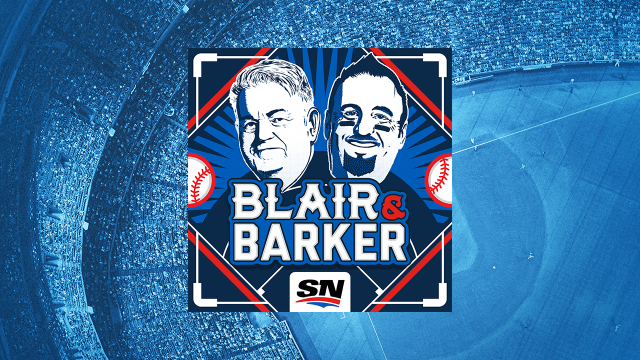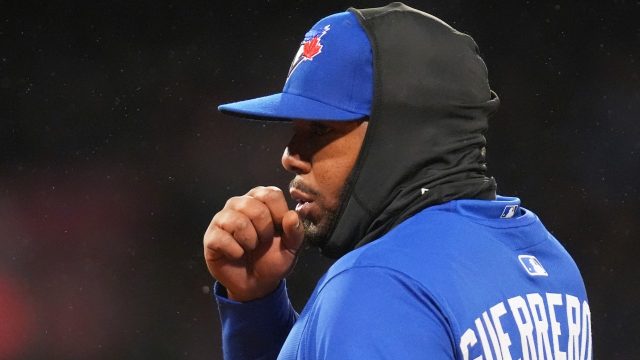
TORONTO — I don’t know how the next 14 years of Toronto Blue Jays history will shake out, let alone what Vladimir Guerrero, Jr. will look like in his late 30s, but that’s OK.
The real-world news of the day offers no guarantee we won’t be living by then in a dystopian hellscape. In the very least, the news that Guerrero and the Blue Jays have agreed to a 14-year, $500-million contract extension (pending a physical examination) is a welcomed departure from the unwelcomed departures that usually occur in this city.
It’s true that long-term deals mostly don’t end well wherever they’re signed and whomever signs them, but for now, we’re spared the drama of seeing this much-beloved sports personality leave Toronto. Mats Sundin. Vince Carter. Tracy McGrady. Kawhi Leonard. Kyle Lowry. Carlos Delgado, Roy Halladay and the 2015-2016 Blue Jays. Throw Alex Anthopoulos in there if you must. All of them departures that carried a whiff of bitter disappointment, organizational dysfunction, contractual shenanigans, bruised feelings, family interference (how is Kawhi’s Uncle Dennis, anyhow?) or, simply, a sense that it was time for both sides to move on.
At least Kawhi and Kyle left us a ring.
Are the Blue Jays closer to winning a World Series now that they’ve locked up Guerrero? No more than they were before being swept by the New York Mets. And what president and chief executive officer Mark Shapiro says is still true: It’s a winning team that fills a ballpark, not just dollar hot dogs and tiki bars and one star player.
Still.
Getting Guerrero’s name on an extension gives this front office one less thing to do in the off-season — which is good because, to be charitable, it’s an underwhelming list of hitters they’ve run through town since tying the can to Teoscar Hernandez and Lourdes Gurriel Jr. They haven’t been able to build around Guerrero since over-reacting to that home-field playoff implosion to the Seattle Mariners. Tough to imagine them building something without him.
It’s also evidence of ownership’s commitment to its payroll because the truth is that making the largest offer for Corbin Burnes or matching the offer to Shohei Ohtani and giving Juan Soto and Roki Sasaki cause to think seriously — that’s just not the same as getting something across the finish line.
However we got here, and whoever ran the anchor leg in negotiations, only matters to the chattering classes. Most people just want to know if it’s OK to buy the jersey. In this case, it is.
-

-
Blair & Barker
Jeff Blair and Kevin Barker talk all things Blue Jays and MLB. Airing live on Sportsnet 590 The FAN, Sportsnet 360 and available on demand wherever you get your podcasts.
This is not the first time that the Blue Jays and this ownership have made an impact on the market — and we’re not talking about the free-agent deals signed by George Springer or Kevin Gausman or Anthony Santander.
Newsflash: this franchise wasn’t entirely dormant between Joe Carter “touching them all” in 1993 and Jose Bautista flipping his bat in 2015.
In 2005, they gave B.J. Ryan a five-year, $47-million deal that was the largest ever for a closer. That same year, they were ahead of the “opt-out” curve in A.J. Burnett’s free-agent deal. One year later, they signed Vernon Wells to a seven-year, $126-million extension that at the time was the sixth-largest contract in baseball history and, most memorably, the Blue Jays under Ted Rogers celebrated the purchase of the franchise and the Rogers Centre by making Carlos Delgado the highest-paid player in the game, albeit briefly.
Then-commissioner Bud Selig was upset that the Blue Jays would give out a four-year, $68-million deal even before the sale of the team from Interbrew had been formally approved.
I remember getting a tap on the shoulder from Rich Levin, Selig’s media relations man, before the first game of the 2000 World Series. “You should talk to Bud,” he said.
That’s not something that happened every day. So, yeah, I tracked down the commissioner. Actually, no: he was waiting for me.
I asked Selig if the signing raised his eyebrows. “More than my eyebrows went up, I’ll tell you,” he said. “Between that and ticket requests, believe me when I got home, I was tired.”
“I need to talk to them (Rogers Communications),” Selig said. “They have talked to me about it … but, still it’s a very, very interesting development, to say the least.”
Formal approval was eventually given, of course, and by then the fuss seemed misplaced. Two months later, after the winter meetings in Dallas, Major League teams had given out close to a billion dollars to free agents, including a 24-hour period where Manny Ramirez signed an eight-year, $160-million deal with the Boston Red Sox and Alex Rodriguez inked a 10-year, $252-million pact with the Texas Rangers. By the time Opening Day rolled around, Delgado’s annual salary — $13.65 million for accounting purposes — was the third highest in baseball.
Then-president and chief executive officer Paul Godfrey responded to Selig’s criticism by stating — correctly — that signing Delgado was a necessary statement of purpose on the part of new ownership. Delgado’s deal became a flash point when J.P. Ricciardi took over as G.M. — it represented 22 per cent and 33 per cent of the team’s total payroll in two seasons — and Delgado was allowed to leave as a free-agent without compensation because it was feared he’d accept the team’s qualifying offer.
Like I said, it often hasn’t ended well in these parts, regardless of the sport. Yet we can forget about it for this one time. Maybe Vladdy really does spend his whole career here, wins a bunch of things and becomes the first home-grown, wire-to-wire, Blue Jays player to go into the Hall of Fame. All I know is that while the first World Series title since 1993 really isn’t closer today, it kind of feels like it is. And if you’re already worried about how this deal will age, well, I don’t know what to tell you. Maybe just stop watching sports. The rest of us are going to enjoy not having to say goodbye for a change.






